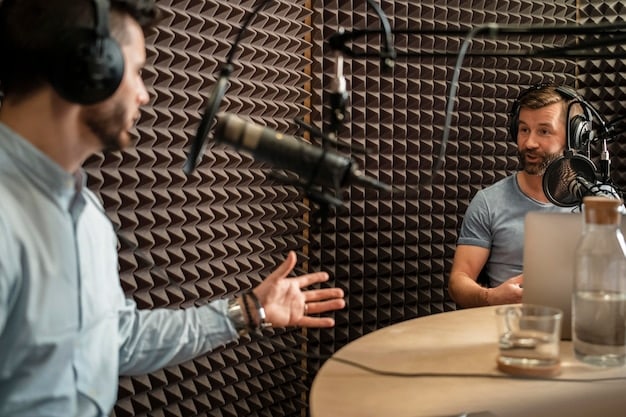Podcast Interview Techniques: Mastering Engaging Conversations in 2025

Podcast interview techniques in 2025 require a blend of preparation, active listening, and adaptability to create engaging conversations, leveraging technology and understanding audience expectations for compelling content.
The landscape of podcasting is constantly evolving, and mastering podcast interview techniques: mastering the art of engaging conversations in 2025 requires a strategic approach. This article delves into the essential methods for crafting compelling interviews that resonate with listeners and stand out in a crowded market.
Podcast Interview Preparation: Laying the Groundwork
Effective podcast interviews don’t happen by accident. Thorough preparation is essential for creating a successful and engaging conversation. This involves researching the guest, defining clear objectives, and structuring the interview to maximize its impact.
Guest Research and Background Checks
Before diving into the interview, take the time to thoroughly research your guest. This means going beyond a simple Google search and delving into their background, accomplishments, and previous interviews. Understanding their expertise and perspective will allow you to ask more informed and insightful questions.
Defining Interview Objectives and Key Talking Points
What do you hope to achieve with this interview? Identifying clear objectives will help you stay focused and ensure that the conversation remains relevant to your audience. Determine the key talking points that you want to cover and structure the interview accordingly.
- ✅ Research guest background thoroughly.
- ✅ Define interview objectives clearly.
- ✅ Structure interview for maximum impact.
- ✅ Prepare insightful and informed questions.
By laying a solid foundation through careful preparation, you can set the stage for a podcast interview that is both informative and engaging, ultimately capturing the attention of your audience.
Mastering Active Listening: The Key to Engaging Conversations
Active listening is a cornerstone of effective podcast interviewing. It involves fully concentrating on what the guest is saying, understanding their message, and responding thoughtfully. This creates a more dynamic and engaging conversation for both the interviewer and the listener.
The Art of Attentive Listening and Observing
Pay close attention not only to the words your guest is saying but also to their tone, body language, and overall demeanor. Observe their reactions and adjust your questions accordingly. This will help you uncover deeper insights and create a more authentic connection.
Asking Follow-Up Questions
Don’t be afraid to deviate from your prepared questions and ask follow-up questions based on the guest’s responses. This shows that you are genuinely interested in what they have to say and allows you to explore topics in more depth. Follow-up questions can lead to unexpected and valuable insights.
- ✅ Concentrate fully on guest’s words.
- ✅ Understand their message and respond thoughtfully.
- ✅ Observe tone, body language, and demeanor.
- ✅ Ask follow-up questions for deeper insights.
Active listening is not just about hearing; it’s about understanding and responding in a way that fosters a connection and encourages open communication, making the interview more engaging for everyone involved.
Crafting Compelling Questions: Engaging Your Guests and Audience
The quality of your questions directly impacts the quality of the interview. Crafting compelling questions that are thought-provoking, open-ended, and relevant to your audience is essential for creating an engaging and memorable experience.
Open-Ended Questions
Avoid asking questions that can be answered with a simple yes or no. Instead, focus on open-ended questions that encourage your guest to elaborate and share their unique perspective. This will lead to more insightful and engaging responses.
Thought-Provoking Questions
Challenge your guest to think critically and share their thoughts on complex issues. Thought-provoking questions can spark interesting discussions and provide valuable insights for your audience. These questions should encourage deeper reflection and analysis.
- ✅ Ask questions that promote discussion.
- ✅ Create emotional connection with audience.
- ✅ Use humor appropriately for entertainment.
- ✅ Know appropriate times for personal questions.
Crafting compelling questions is an art form that requires careful consideration of your guest, your audience, and the overall objectives of the interview. By asking the right questions, you can unlock valuable insights and engage your listeners in a meaningful way.
Leveraging Technology for Seamless Interviews
In 2025, technology plays a crucial role in facilitating seamless and high-quality podcast interviews. From recording equipment to editing software, understanding and utilizing the right tools is essential for producing a professional-sounding podcast.
Utilizing Recording Software and Equipment
Invest in quality recording equipment, including microphones, headphones, and audio interfaces. Familiarize yourself with recording software and learn how to optimize your audio settings for the best possible sound quality. Experiment with different setups to find what works best for you.
Remote Interviewing and Cloud-Based Solutions
Remote interviewing has become increasingly popular, and cloud-based solutions offer a convenient way to connect with guests from anywhere in the world. Explore platforms like Zoom, Skype, and Google Meet for conducting remote interviews. Ensure you have a stable internet connection and a reliable backup plan in case of technical issues.
Leveraging technology effectively can streamline the interview process and enhance the overall quality of your podcast. By embracing the latest tools and techniques, you can create a professional-sounding podcast that resonates with your audience.
Adapting to Different Interview Styles and Personalities
Every guest is unique, and adapting to different interview styles and personalities is essential for creating a comfortable and engaging conversation. Being flexible and responsive will allow you to connect with your guests on a personal level and elicit their best responses.
Building Rapport and Creating a Comfortable Environment
Start the interview by building rapport with your guest. Engage in casual conversation, ask about their day, and create a relaxed and welcoming environment. This will help them feel more comfortable and open to sharing their thoughts and experiences.
Handling Challenging Guests
Not every guest will be easy to interview. Some may be hesitant, while others may be overly talkative or prone to rambling. Develop strategies for handling challenging guests, such as gently redirecting the conversation, asking clarifying questions, and setting clear boundaries.
Adapting to different interview styles and personalities is a crucial skill for any podcast host. By being flexible, responsive, and empathetic, you can create a comfortable and engaging environment that allows your guests to shine.
Post-Interview Editing and Production Techniques
The work doesn’t end when the interview is over. Post-interview editing and production are essential for polishing the audio, removing errors, and adding value to the listening experience. Mastering these techniques will help you create a professional and engaging podcast.
Audio Editing and Noise Reduction
Use audio editing software to remove unwanted noises, such as background hum, microphone pops, and awkward pauses. Learn how to smooth out transitions, adjust audio levels, and optimize the overall sound quality. Consider investing in noise reduction plugins to minimize distractions.
Adding Music, Intros, and Outros
Enhance the listening experience by adding music, intros, and outros to your podcast. Choose music that complements the tone and style of your podcast and create engaging introductions and conclusions that capture the attention of your audience. Properly mix and master the audio to ensure a seamless and professional-sounding product.
- ✅ Remove background noise in audios.
- ✅ Add complementing music, intros, and outros.
- ✅ Keep a well-structured audio file.
- ✅ Review the podcast for improvements.
Post-interview editing and production are crucial steps in creating a high-quality podcast that your listeners will enjoy. By mastering these techniques, you can transform a raw interview into a polished and engaging listening experience.
Promoting Your Podcast Interview
Once your interview is edited and ready to go, it’s time to promote it. Effective promotion ensures your hard work reaches a wider audience, driving listens and building your podcast’s presence.
Crafting Engaging Titles and Descriptions
The title and description are the first things potential listeners see, make them count. Use keywords, and compelling language that tells them what unique insights they’ll gain from this particular interview. Tease a standout moment or key piece of advice.
Social Media Promotions
Optimize your social media promotions by using relevant hashtags and engaging visuals to attract listeners. Include direct links to where people can tune in. Tease segments of the interview through short video snippets, creating buzz. Consider also running a paid promotional campaign for wider reach.
Strategic podcast promotion is as important as the interview itself. It’s about ensuring your compelling conversations land in front of the right listeners, building up your audience and boosting the podcast’s overall success.
| Key Point | Brief Description |
|---|---|
| 🎤 Interview Prep | Research the guest and define objectives well. |
| 🎧 Active Listening | Engage fully and ask follow-up questions. |
| ❓ Question Crafting | Ask open-ended and thought-provoking questions. |
| ⚙️ Tech Leverage | Use the most recent software and equipment. |
[Frequently Asked Questions]
▼
Guest research lays the groundwork for insightful questioning and a more engaging conversation. It allows you to tailor questions to their expertise and achievements, leading to deeper discussions.
▼
Active listening demonstrates respect and encourages the guest to open up, creating a more dynamic exchange. It enables the extraction of key points and prompts smarter, relevant follow-up questions.
▼
Technology aids in recording high-quality audio, conducting remote interviews, and streamlining post-production. Using reliable software and equipment enhances the listener experience and overall professionalism.
▼
Handle difficult guests by setting clear expectations at the start, maintaining a calm demeanor, and subtly guiding the conversation back on track. Stay professional and respectful, regardless of the guest’s behavior.
▼
Post-interview edits should focus on removing filler words, improving audio quality via noise reduction, and adding engaging elements like intro music and transitional segments. A polished edit enhances listener engagement.
Conclusion
Mastering podcast interview techniques for engaging conversations in 2025 involves preparation, active engagement, technological savvy, and adaptability. Applying these strategies positions you for creating compelling interviews. Embracing these skills paves the way for captivating content.





